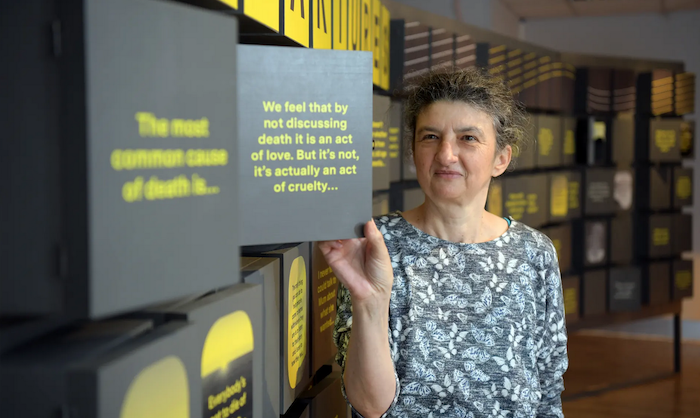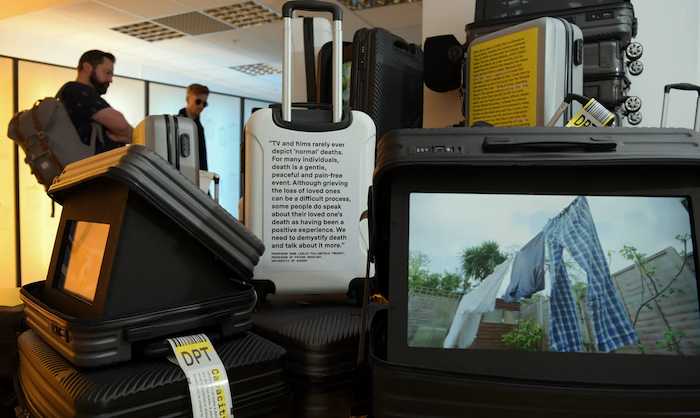Initiative comes as survey suggests talking about dying is still an uncomfortable subject

It comes to us all in the end. But despite the inevitability of death, few of us feel comfortable talking about it and most have made no plans for how we would like our final moments to play out, according to research.
Now, leading experts from the Academy of Medical Sciences are launching a campaign aimed at making death a more acceptable topic of conversation.
Prof Dame Lesley Fallowfield, a cancer psychologist at the University of Sussex, is urging people to draw up death plans, much like they prepare for the birth of a baby.
“We have birth plans where people record what they’d prefer to happen,” she said. “We all know that events sometimes supersede your wishes, but we can think it through and make it the best it can possibly be. Making a death plan shouldn’t be seen as a macabre thing to do.”
Fallowfield said failure to plan and talk about death meant many people do not spend their final weeks and hours as they would have chosen and families are frequently left with regrets.
A poll by the academy, conducted by Ipsos Mori and published this week, found that six in 10 people feel they know little or nothing about the final hours of life, with many people getting information about dying from documentaries or soaps rather than conversations with medical professionals.
One third of the nearly 1,000 people who participated in face-to-face interviews declined to answer questions about death and dying, suggesting that many feel uncomfortable talking about the subject. “Challenging this taboo is at the heart of the academy’s national campaign,” said Prof Sir Robert Lechler, the academy’s president.
To jump-start the conversation, the academy has opened a pop-up installation, The Departure Lounge, at Lewisham shopping centre in south-east London, aimed at engaging people with the topic. Occupying what was previously a mobile phone shop, it features a large pile of suitcases emblazoned with messages and questions about the final journey we all face.
On the first day of its month-long residency, it prompted mixed reactions from shoppers.
Michelle Charlesworth, 35, from Lewisham, said that as a result of her visit she was planning to write down what she would like to happen when she dies. “It takes that responsibility off your loved ones,” she said. “It sounds like a small thing, but I’d want to be in a really nice pair of pyjamas. I’d probably want to be cremated or buried in them too, actually.”

Bella Vivat, who works in palliative care research at UCL, said visiting had convinced her to draw up an advanced directive, a legal document in which a person specifies what actions should be taken for their health if they are no longer able to make decisions for themselves. “We live our lives as though we’re not going to die,” she said. “I’m going to go away today and do that.”
Bambii Nzinga, 24, an actor and screenwriter, who is working as a host at the installation, said she initially took on the job because she thought it might provide interesting writing material. Then her four-year-old son started asking her about death. “I was so prepared for the birds and the bees conversation,” she said. “But when he asked me if I was going to die, I didn’t know what to say.”
On the spur of the moment she told him she was never going to die, but has since revised her answer. “Children are happy to talk about death, it’s us that put the fear in them,” she said.
Some wandered into the lounge under the impression that a suitcase sale was underway and looked baffled after reading signs such as “everybody’s got to die of something”. “I’m not ready for death,” one unsuspecting shopper exclaimed making a quick exit.
Smaller versions of the lounge will be appearing at 30 other locations across the UK over the summer.
Fallowfield said that while death was normally sad, failing to talk about the inevitable can make the experience more traumatic for both the person who is dying and their relatives afterwards. “It’s quite awful when you see families who’ve never talked about it having these hollow conversations and feigned smiles about a future that’s never going to be realised,” she said. “When you see families who have openly acknowledged death, they often share sad and tearful moments, but also laugh and comfort each other.”
The poll found that people were around as likely to get information about death from documentaries (20%) or films, dramas and soaps (16%) as they are from medical professionals (22%). The distressing or even glamourised portrayals of death in films and television meant that people may be getting a unrealistic picture of what lies ahead.
“In films you often get dying words – someone gasping out things like ‘Please tell Jim I love him’, which sort of makes me laugh,” said Fallowfield. “I’ve never seen that happen.”
Instead, she said, people normally “quietly drift away”. “They start to lose consciousness, their breathing may become laboured,” she said. “It’s really important to hold their hand and continue talking to them. That makes you feel good too. It doesn’t necessarily have to be horribly traumatic.”
Complete Article ↪HERE↩!
